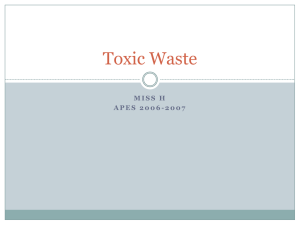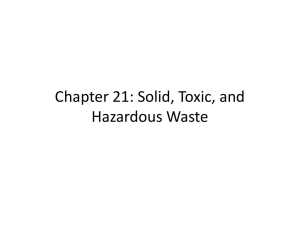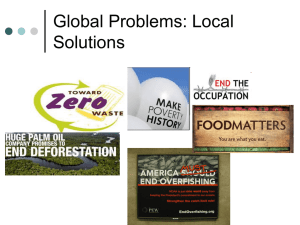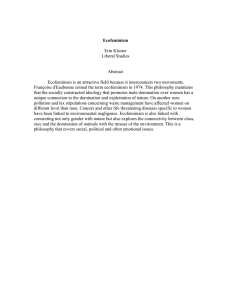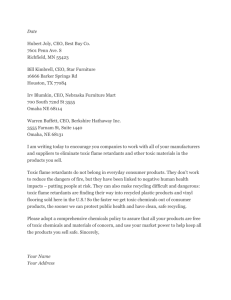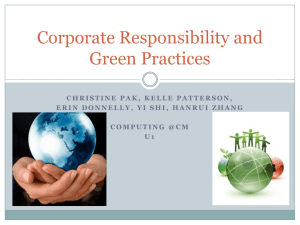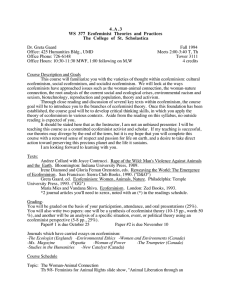Green Criminology
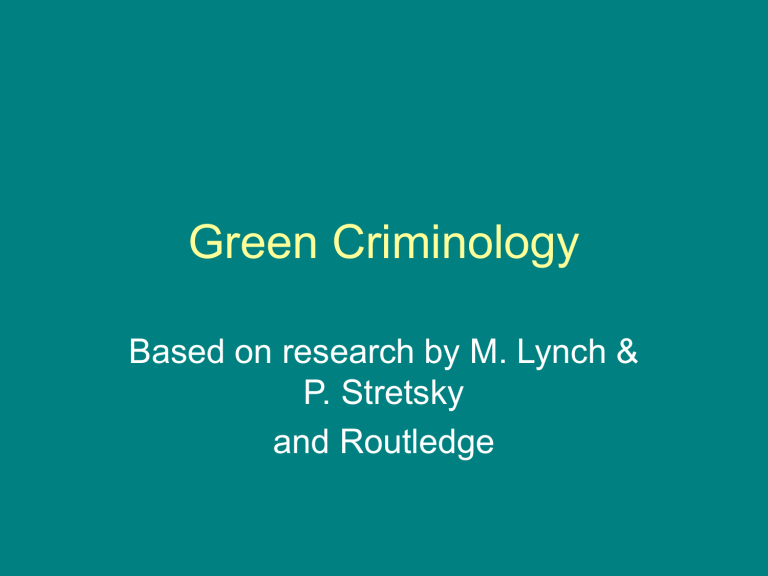
Green Criminology
Based on research by M. Lynch &
P. Stretsky and Routledge
Social Construction of Crime
• Like other crimes, green criminology is a social construction
• Influenced by:
• social locations
• Power relations in society
• Definitions of environmental crimes
• Media
• Political process
Corporate vs. Environmental
Justice
• Two very different definitions on what it means “to be green.”
• 1970s was a time of political activism aimed at environmental protection
Corporate Definition
• 1990s was supposed to be the decade of the environment
• But things didn’t quite go as planned…..
• The involvement of corporations actually sidetracked the movement
• Corporations were able to influence the social construction of green through the use of public relations and the mass media
• This version was: mild less radical de-political zed vision
• Stressed consumption rather than production issues
• A human could become “green” just by buying the correct products
• This was known as “greenwashing”
• This enabled corporations to defuse and redirect support for environment
• Why did corporations do this?
• Radical environmental positions were a threat to corporations
• They wanted “business as usual.”
An example of “business as usual”
• Love Canal near Niagara Falls
• In the 1940s Love Canal was an abandoned navigation channel
• For years Hooker Chemical dumped thousands of drums filled with toxic chemical waste directly into the canal
• In 1952 the canal was covered up
• A year later Hooker Company sold the land to the Niagara Falls Board of
Education
• A school was built
• In the 1970s Niagara Falls experienced a season of very heavy rain
• Chemicals began to seep up onto the school grounds and neighboring homes, including their basements
• Federal and state officials investigated and found:
• 88 separate chemicals, some in concentrations 250 to 5,000 times higher than acceptable safety levels
• 11 of the 88 were known carcinogens
• This case received massive media attention
• Though Hooker Company had a total disregard for the environment or future generations they had not broken any law
• Since then new laws have been passed…
• Though many were then reversed by the
Reagan administration
The “greenwashing” continues
• Chevron has commercials proclaiming they care about the environment
• Just look at all they have done for the El
Segundo Blue Butterfly
• Of course, the butterfly would have been safe if its habitat was not on top of the
U.S.’s largest underground oil spill
Environmental Justice (EJ)
• Three major types of EJ
• Ecofeminism
• Environmental racism
• Red-green movement
Ecofeminism
• Began in the 1970s
• Criticized capitalist profit-growth orientation and the patriarchy
• Connects the domination and exploitation of nature with the domination and exploitation of women
• Argues that women are more concerned with survival than men
• It has been shown that women do put more money back into their own communities than their male counterparts
• Ecofeminism can be achieved by
• Reorienting cultural values
• Returning to small-scale local economies
• And grass root democracy
Environmental Racism
• Simultaneously advocates EJ and the elimination of racial discrimination in environmental decisions
• Argues that toxic factories, pollution and waste sites affect communities of color more than Caucasians
• Short term goals: race-linked theory and action
• Long term goals:
• Elimination of exposure to dangerous products and practices for all
Union Carbide Chemical plant in
Bhopal, India
• December 1984
• The world’s worst environmental accident occurred
• (Chernobyl was a close 1 st runner up)
• The plant used highly toxic chemicals in its production process
• Water somehow got mixed into the toxic chemicals
• An explosion occurred
• It is estimated that more than 6,000 humans died as a result of this “accident”
• 60,000 other humans were seriously affected by the toxic gases
• Over 20,000 of which who were permanently injured as a result of the exposure
• It is argued that far fewer humans would have died if……
• The plant had not been located so close to the shanty towns of the poor
• The true extent of the damage will not be known for twenty or more years
• This could affect birth defects in upcoming generations
• Impact the natural environment and wildlife
Red-green movement
• Relates economic oppression to environmental degradation
• In a class society environmental problems are more likely to impact the working class and the poor
• Example?
• Goal: Ecological Socialism
• A method of simultaneously eliminating environmentally destructive
• Unsustainable production practices
• Exploitative mode of production
• All three are connected

